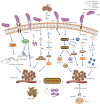Application of Fusobacterium nucleatum as a biomarker in gastrointestinal malignancies
- PMID: 38994170
- PMCID: PMC11236247
- DOI: 10.4251/wjgo.v16.i6.2271
Application of Fusobacterium nucleatum as a biomarker in gastrointestinal malignancies
Abstract
The morbidity and mortality of gastrointestinal (GI) malignancies are among the highest in the world, posing a serious threat to human health. Because of the insidious onset of the cancer, it is difficult for patients to be diagnosed at an early stage, and it rapidly progresses to an advanced stage, resulting in poor treatment and prognosis. Fusobacterium nucleatum (F. nucleatum) is a gram-negative, spore-free anaerobic bacterium that primarily colonizes the oral cavity and is implicated in the development of colorectal, esophageal, gastric, and pancreatic cancers via various intricate mechanisms. Recent development in novel research suggests that F. nucleatum may function as a biomarker in GI malignancies. Detecting the abundance of F. nucleatum in stool, saliva, and serum samples of patients may aid in the diagnosis, risk assessment, and prognosis monitoring of GI malignancies. This editorial systematically describes the biological roles and mechanisms of F. nucleatum in GI malignancies focusing on the application of F. nucleatum as a biomarker in the diagnosis and prognosis of GI malignancies to promote the clinical translation of F. nucleatum and GI tumors-related research.
Keywords: Biomarker; Diagnosis; Fusobacterium nucleatum; Gastrointestinal malignancies; Prognosis.
©The Author(s) 2024. Published by Baishideng Publishing Group Inc. All rights reserved.
Conflict of interest statement
Conflict-of-interest statement: All the authors report no relevant conflicts of interest for this article.
Figures

Similar articles
-
Fusobacterium nucleatum in tumors: from tumorigenesis to tumor metastasis and tumor resistance.Cancer Biol Ther. 2024 Dec 31;25(1):2306676. doi: 10.1080/15384047.2024.2306676. Epub 2024 Jan 30. Cancer Biol Ther. 2024. PMID: 38289287 Free PMC article. Review.
-
The role of Fusobacterium nucleatum in cancer and its implications for clinical applications.Mol Oral Microbiol. 2024 Dec;39(6):417-432. doi: 10.1111/omi.12475. Epub 2024 Jul 11. Mol Oral Microbiol. 2024. PMID: 38988217 Review.
-
Progress in characterizing the linkage between Fusobacterium nucleatum and gastrointestinal cancer.J Gastroenterol. 2019 Jan;54(1):33-41. doi: 10.1007/s00535-018-1512-9. Epub 2018 Sep 22. J Gastroenterol. 2019. PMID: 30244399 Review.
-
Analysis of 16S rRNA genes reveals reduced Fusobacterial community diversity when translocating from saliva to GI sites.Gut Microbes. 2020 Nov 9;12(1):1-13. doi: 10.1080/19490976.2020.1814120. Gut Microbes. 2020. PMID: 33054632 Free PMC article.
-
Involvement of Fusobacterium nucleatum in malignancies except for colorectal cancer: A literature review.Front Immunol. 2022 Aug 17;13:968649. doi: 10.3389/fimmu.2022.968649. eCollection 2022. Front Immunol. 2022. PMID: 36059542 Free PMC article. Review.
References
-
- Islami F, Goding Sauer A, Miller KD, Siegel RL, Fedewa SA, Jacobs EJ, McCullough ML, Patel AV, Ma J, Soerjomataram I, Flanders WD, Brawley OW, Gapstur SM, Jemal A. Proportion and number of cancer cases and deaths attributable to potentially modifiable risk factors in the United States. CA Cancer J Clin. 2018;68:31–54. - PubMed
-
- Miller KD, Nogueira L, Devasia T, Mariotto AB, Yabroff KR, Jemal A, Kramer J, Siegel RL. Cancer treatment and survivorship statistics, 2022. CA Cancer J Clin. 2022;72:409–436. - PubMed
-
- Kratzer TB, Jemal A, Miller KD, Nash S, Wiggins C, Redwood D, Smith R, Siegel RL. Cancer statistics for American Indian and Alaska Native individuals, 2022: Including increasing disparities in early onset colorectal cancer. CA Cancer J Clin. 2023;73:120–146. - PubMed
-
- Anderson JC, Rex DK. Performing High-Quality, Safe, Cost-Effective, and Efficient Basic Colonoscopy in 2023: Advice From Two Experts. Am J Gastroenterol. 2023;118:1779–1786. - PubMed
Publication types
LinkOut - more resources
Full Text Sources

